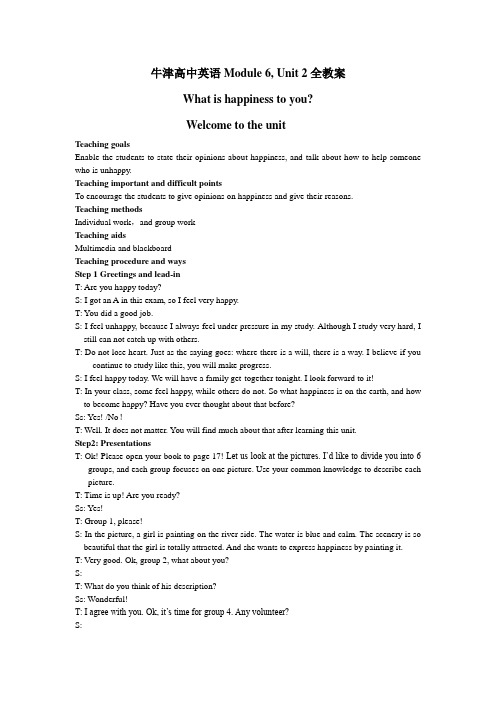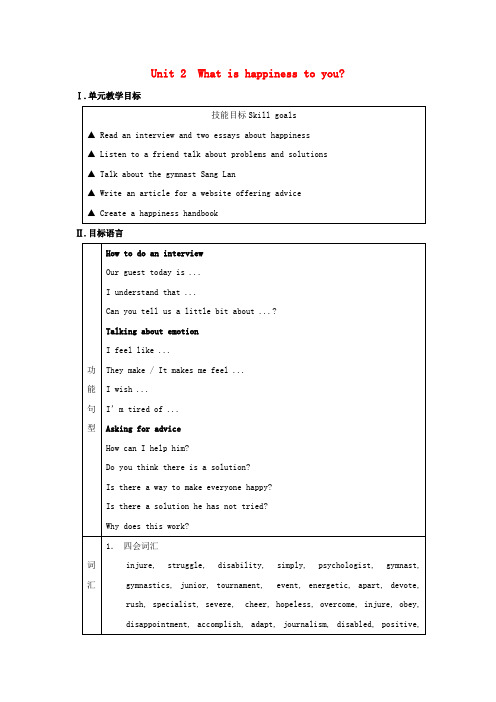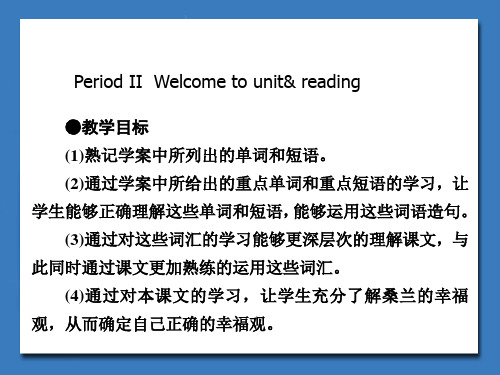牛津高中英语模块六 Unit2词汇教学案
- 格式:docx
- 大小:19.47 KB
- 文档页数:12

牛津高中英语Module 6, Unit 2全教案What is happiness to you?Welcome to the unitTeaching goalsEnable the students to state their opinions about happiness, and talk about how to help someone who is unhappy.Teaching important and difficult pointsTo encourage the students to give opinions on happiness and give their reasons.Teaching methodsIndividual work,and group workTeaching aidsMultimedia and blackboardTeaching procedure and waysStep 1 Greetings and lead-inT: Are you happy today?S: I got an A in this exam, so I feel very happy.T: You did a good job.S: I feel unhappy, because I always feel under pressure in my study. Although I study very hard, I still can not catch up with others.T: Do not lose heart. Just as the saying goes: where there is a will, there is a way. I believe if you continue to study like this, you will make progress.S: I feel happy today. We will have a family get-together tonight. I look forward to it!T: In your class, some feel happy, while others do not. So what happiness is on the earth, and how to become happy? Have you ever thought about that before?Ss: Yes! /No!T: Well. It does not matter. You will find much about that after learning this unit.Step2: PresentationsT: Ok! Please open your book to page 17! Let us look at the pictures. I’d like to divide you into 6 groups, and each group focuses on one picture. Use your common knowledge to describe each picture.T: Time is up! Are you ready?Ss: Yes!T: Group 1, please!S: In the picture, a girl is painting on the river side. The water is blue and calm. The scenery is so beautiful that the girl is totally attracted. And she wants to express happiness by painting it.T: Very good. Ok, group 2, what about you?S:T: What do you think of his description?Ss: Wonderful!T: I agree with you. Ok, it’s time for group 4. Any volunteer?S:T: Yes! That is it! Very good! Next group?S:T: Now, group 6?S:T: Wonderful!Step 3 DiscussionT: Up to now, we have talked about the six pictures. Now, discuss the questions below in groups of four.T: Ok, time is up, are you ready?Ss: Yes!T: We all know that reasons for happy are quite different. But, are there any things that can make everyone happy?S:T: Very good opinion. I agree with you. When we reach our goals, we will feel happyS:T: Good.S:T: Wonderful! Just now, we all stated some things that may make everyone happy. Everyone did a good job. Now, let us move on to next question: How to help our unhappy friends?S:T: That is it! And I still remember, just now, some said he was unhappy because he felt under pressure in study. Do you think that he will make progress in the future?Ss: Of course. We all believe that!T: Everyone can do things well with support from friends.S:T: Good idea! Any others?S: I will say with my unhappy friends, too. I will listen to whatever he/ she tells me. If possible, I will help him/her find out the problems and give some suggestions.T: That is so great of you!Step 4: SummaryT: Today, we have discussed about happiness, and all of you have done a good job. I feel so happy with you. At the end of this class, I hope every one of you will be happy every day. I also hope you can make everyone around you happy. So much for today.Stp5: HomeworkPreview Reading partReadingObjectives:1.To help Ss get a general idea about the text.2. To make Ss become familiar with the detailed information about the text.3. To help Ss master Reading Strategy.Teaching important points:1.How to make the students understand the passage better.2.How to help the students finish all the exercises.3.How to help the students develop their creative, comprehensive and consolidating abilities. Interaction Patterns: Teachers -class, individuals, pairsTeaching Aids:1. The multimedia2. The blackboardProcedures for teaching:Step1: lead-in1.Tell students that they are going to read an interview from a TV programme about happiness. Ask students how much information they know about Sang Lan. If possible, you can ask students to collect some relevant information before class. You may conduct the activity as follows: Today we are going to talk about a special girl named Sang Lan, who used to be a successful gymnast. Can you search for more information about this girl?2. Ask students to exchange the background information about Sang Lan they have found with each other. Ask students to think about Sang Lan’s experiences and answer the following questions:Different people find happiness and fun in different things. There are certainly no criteria assessing which way of being happy is the best. Do you think Sang Lan had had a happy life before she was injured?Do you think Sang Lan has a happy life now?What would you do if you had the same problem?Encourage students to discusss freely their true feelings about Sang Lan’s story.3. Ask students to think about the following question:Suppose you had a chance to talk face to face with Sang Lan, what would you like most to ask her about?The following are suggested answers:Childhood and school educationThings or experiences that had left her the deepest impression before the accidentReasons for learning gymnasticsThings that encourage her during hard timesCurrent physical conditionExpectations for futureFuture career plansAttitudes towards life, success and failureStep2: First readingFind the answers to Part AStep3: Read the text again and complete Parts C1 and C2.Step4: cloze (Ep21)Step5: discussion. (F)Step6: Language points:1. goal 1)目的,目标ach ieve/reach/realize one’s goal实现目标;2)(球戏等的)得分,赢分make/score/get a goal 得一分2. times 时代;时势;境况(常用复);the times 当代The times are different. 时代不同了。

Unit 2 What is happiness to you? Ⅰ.单元教学目标Ⅱ.目标语言Ⅲ. 教材分析与教材重组1. 教材分析本单元以What is happiness to you 为话题,展开什么是幸福、如何寻找幸福的讨论。
通过阅读一篇采访,使学生了解体操运动员桑兰是如何面对困难,以及如何在困境中寻找幸福的。
同时让学生了解采访提问的技巧以及采访文章的阅读策略。
运用所学的词语、结构正确表达自己的心情,学生将综合运用各种技能(确定问题,通过提问获取信息,讨论解决方案)针对网站上的文章提出建议,最终完成该任务。
课堂活动是写一篇关于对幸福的理解的文章,学生将先阅读两篇文章,了解不同的人对幸福的不同理解,然后完成写作任务。
通过本单元的学习学生能够正确认识、珍惜幸福,及时调试自己的心情,积极面对问题、解决问题,以利于自己身心的健康发展。
1.1 Welcome to the unit 板块提供了六幅图画,要求学生根据自己对每幅图画的理解用一两句话加以描述,然后讨论并回答相关问题。
1.2 Reading 包括A、B、C1、C2、D、E、F 7部分。
A 所设计的三个问题要求学生通过快速阅读了解这篇采访的主题,被采访人的姓名以及著名运动员桑兰的一些个人基本信息; B 部分要求学生通过阅读对一名心理学家的采访,了解体操运动员桑兰是如何在困境中寻找幸福的; C1是对采访细节内容的考查; C2 要求学生通过连线,理清有关桑兰故事的发展脉络,同时也可以看作是对文章细节内容的考查; D 训练学生根据课文正确理解新的词汇与表达的能力; E是一篇关于桑兰的新闻报道,要求学生能够根据采访内容以及该部分的上下文,正确选填词语。
F设计了与采访内容相关的三个问题,要求学生展开讨论,以获得对文章内容的更进一步了解。
Reading Strategy 介绍了采访文章的阅读策略。
1.3 Word power 要求学生运用正确的词汇与习语来表达情绪;所设计的三个练习在于检测学生灵活运用这些词汇的能力。


模块六Unit2课文语言点学案(译林牛津版高二英语选修六学案设计)Teaching aims(教学目标):(1) Encourage Ss to raise reading ability by focusing onlanguage points.通过学习语言点增强学生的阅读能力(2) Get Ss to grasp the new language usage in the textby learning them.使学生掌握课文中出现的新的单词词组的用法并能够加以运用Important points & difficult points(重难点):Language usage(语言点用法): search; in case; a bit; while;mean; make+宾语补足语Teaching methods(教学方法):(1) Ss do the exercises by looking at the dictionaries.学生通过查字典自主学习(2) the teacher check the answers.教师点拨,校对答案Teaching aids(教学工具): a blackboard, dictionaries(黑板, 字典)Procedure(教学过程):Step 1 RevisionSay something about happiness.Step 2 Language points (learn and use)1. The search for happiness 找寻快乐search v./n.○1search +宾语搜查(某人或某处), 搜索○2search for…in search of…搜寻;寻找…in one’s search for○3search some place for sth. 在某地搜寻某物Ex:When I enter the classroom, he was D my deskfor something.A. searching forB. lookingC. looking forD. searching【翻译】: 我们在森林中寻找那失踪的男孩We searched the forest for the lost boy.警察搜查他的身体,寻找那丢失的钱包.The police searched him for the lost wallet.2. To others, happiness means achieving success insomething, such as meeting a goal. (p18. line2)对其他人来说,幸福意味着成功,比如达到一个目标。


模块六Unit2课文语言点学案(译林牛津版高二英语选修六学案设计)Teaching aims(教学目标):(1) Encourage Ss to raise reading ability by focusing on language points.通过学习语言点增强学生的阅读能力(2) Get Ss to grasp the new language usage in the text by learning them.使学生掌握课文中出现的新的单词词组的用法并能够加以运用Important points & difficult points(重难点):Language usage(语言点用法): search; in case; a bit; while; mean; make+宾语补足语Teaching methods(教学方法):(1) Ss do the exercises by looking at the dictionaries.学生通过查字典自主学习(2) the teacher check the answers.教师点拨,校对答案Teaching aids(教学工具): a blackboard, dictionaries(黑板, 字典) Procedure(教学过程):Step 1 RevisionSay something about happiness.Step 2 Language points (learn and use)1. The search for happiness 找寻快乐search v./n.○1search +宾语搜查(某人或某处), 搜索○2search for…in search of… 搜寻;寻找…in one’s search for○3search some place for sth. 在某地搜寻某物Ex:When I enter the classroom, he was D my desk for something.A. searching forB. lookingC. looking forD. searching【翻译】: 我们在森林中寻找那失踪的男孩We searched the forest for the lost boy.警察搜查他的身体,寻找那丢失的钱包.The police searched him for the lost wallet.2. To others, happiness means achieving success in something, such as meeting a goal. (p18. line2)对其他人来说,幸福意味着成功,比如达到一个目标。
Module 6 Unit 2高二英语备课组Reading and Word power (Language points )1. search1) 名词搜查搜寻I went off in search of a garage where I could buy some petrol.The police continued a long search for the lost child.2) 动词search sb./sth. forThey searched all the room for the missing papers.Scientists are still searching for a cure to the common cold.2. injure 伤害,损伤(主要指在事故中受伤); 损害,伤害(自尊,名誉等)He was badly injured in the accident.Smoking will injure your health.He injured his pride.3. struggle with1)动词He struggled with cancer for four years. 与……搏斗/斗争The shopkeeper struggled against the thief. 与……搏斗/斗争The two leaders are struggling for power. 努力争取;为了……而挣扎/努力We struggled through the crowd.2)名词Don’t give up without ~.Reading was a ~ for him. 阅读对他来说是件费劲的事。
4. times时代in ancient ~ in the ~ of Henrythe writers of the ~ ~ have changed.We had terrible ~. hard ~5. in hospital 住院in the hospital 在医院里6. the world 世人们7. the way 方式the way to do; the way of doing; the way (that/ in which)…I don’t like the way (that/in which) you laugh at her.People like the way he wrote his novels.8★in case以防: if ;because it might happen or has happened that; so as to be safe if something happens~ he arrives before I get back, please ask him to waitTake your umbrella just ~ it rains/just ~ it should rain.★in case of 如果万一(后接名词代词动名词)~ earthquake, crawl under the table.We can call for help ~ an emergency.★in this/that case在这样/那样的情况下He may not be back at seven, ~ we want to leave.★in any case 无论如何不管怎样~, I will come.★in no case决不~ shall we allow smoking in the classroom..~ will we waste any time.★in the case of就……来说Failure is no shame ~ a scientist.9. by: not later than; before与完成时连用~ the time the doctor arrived, the patient had died.~ next Friday, I ought to have finished the project.~ the end of this year, she will have been in Australia for two years.10. describe …as…把……描述成He ~d his school life as interesting and exciting.He ~s himself as a manager, in fact he is a clerk.11. could: might be possible (在这里) 表可能性The new project~ create 5,000 new jobs.The accident ~ have been prevented.12. cost: to lead to the loss of something 动词使……付出代价;花费1) His lazy attitude ~ th child his place in the team.2) The mistake ~ him his job.3) Writing a book ~s time and patience.4) The house ~ him $ 15000.13. rush1)不及物动词冲She rushed into the room.We have to ~ to the hospital.2)及物动词把……急忙送往~ the letter to the post officeHe ~ed his wife to the hospital.3)名词冲,抢购热潮~ hour Christmas ~14.★apart (adv.) (时间或空间上)分离;相隔;不在一起,分开1) The two hills are 22 miles ~. 两座山相隔22英里。
Module 6Unit 2 What is happiness to you ?Reading The search for happiness徐丽金Period 1一、教材简析和教材处理:Module 6 What is happiness to you? 是高中英语模块六的一个谈论如何追求幸福真谛话题的单元。
本单元共分为7个大部分。
此处为本单元核心部分阅读的第一课时,根据高中英语新课程标准,教师主要任务是通过向学生介绍一定的阅读策略并凭借一些阅读技巧来指导学生如何提高自己整体阅读水平的一课,只着重如何培养学生在阅读教材的阅读能力,因此知识点的讲解在此课时不被纳为为重点。
理论依据:《高中英语课程标准》二、Teaching Aims:1.Check and enhance students’reading abilities.2. Train Ss to gain an overall understanding of the article and learn to adopt different readingstrategies.三、Teaching important points:1.Help Ss know something about Sang Lan.2.Help them learn something about “happiness”.四、Teaching difficult points:1. How to read an interview.2.How to undersatand the passage better.五、Teaching methods:1. Improve the students’ reading comprehension.2. Practice to get the students to master what they’ve learnt.3. Discussion to make every student work in class.六、Teaching aids:1. the multi-media2. the blackboard.七、Teaching procedures:Step 1: Lead-in(Show some photos about Sang Lan to the students):Today we are going to talk about a special girl named Sang Lan, who used to be a successful gymnast.What do you know about this girl?Now let’s think about Sang Lan’s experience: Do you think Sang Lan had had a happy life before she was injured? Do you think Sang Lan has a happy life now? What would you do if you had the same problem? Suppose you had a chance to talk face to face with Sang Lan, what would you like most to ask her about?【设计说明】通过看图片和谈论,让学生走近桑兰,把学生很自然地引入到新课中,同时激发了他们学习课文内容的浓厚兴趣。
牛津高中英语模块六 Unit2词汇教学案 牛津高中英语模块六Unit2词汇教学案 .injure①使受伤,弄伤,损伤,损害 ②伤害(名誉、自尊等) Theboyinjuredhislegwhileplayingbasketball. Thiscouldseriouslyinjurethecompany’sreputation. injured:受伤的,被伤害的,感情受伤的 theinjured受伤的人 injuredlooks______________ inaninjuredvoice______________ thedeadandthe___________ 死者及伤者 Theinjured takentothenearesthospital. injury:①伤害,损害②伤,伤口dosb.aninjury伤害某人 It’sasevereinjurytohisreputation.____________________________
Thenurseisdressinghisinjuries.____________________________ 辨析:injure,wound,hurt ①injure一般指由于意外或事故中受伤,指一时难愈之伤。 ②wound指外伤,如刀伤、枪伤、剑伤,尤指在战斗,战争中受伤 ③hurt“受伤”的一般用法,既可指肉体上的伤害,亦可指感情上的伤害,作vi.时;意为“疼,疼痛” 用wound,harm,hurt,injure的正确形式填空: ) Shefelt atyourwords. 2) Don’t youreyesbyreadingindimlight. 3) Thebullet himintheshoulder. 4) Hewas intheaccident. 2.apart adj.&adv.①分开的,分离的②和tell或know连用,意为“区别,分别”③apartfrom远离,和……不在一起;除……之外(尚有);⑶除……之外(无)同except,同besides,aswellas,inadditionto The2housesare500metres____________.这两栋房子相距500m. Ican’ttellthesetwothingsapart._______________________________ 写出下列句子中划线词的汉语意思: ①Apartfromthecost,thecolorofthehatdoesn’tsuitme. ②Ihavefinishedapartfromthelastquestion. ③LucyhasbeenacceptedbyoxfordUniversity,soshehadtoliveapartfromherparents. 3.simply adv.仅仅,只不过;简单地;确定 指出下列句中simply的含义: ①Thebookexplainsgrammarsimplyandclearly. ②Simplyaddhotwaterandstir. ③Thatissimplynottrue. simple adj.①简单的,简易的 ②简朴的,单纯的 simplify vt.简化 simplifiedchinesecharacters______________ 4.adapt vt.&vi.①使适应,使适合②改写,改编 adaptsth.forsth. 改编……成为…… adaptoneselfto使某人自己适应于某事 adapttosth.适应某事 他花了一个月才适应新环境。
It________himamonthto_________himself________hisnewsurroundings. 我们的眼睛慢慢地适应了黑暗。 oureyesslowly____________________thedark. 这部小说已经被改编成电视节目。
adaptable adj.能适应的,适应性强的;可改编的 adaptation n.适应,适应性;改编本 5.inspire vt.①鼓舞,激励 inspiresb.todosth.鼓舞某人做某事 inspiresb.withsth./inspiresth.insb.用某事鼓舞某人 Theactorsinspiredthekidswiththeirenthusiasm.演员们以热情鼓舞着孩子们。 同义句改写:__________________________________________________________ ②赋予某人灵感(尤指写作、绘画、作曲等);启示,启迪 inspiresb. Hispaintingswereclearlyinspiredbymonet’swork.他的绘画显然是受到了莫奈作品的启示。 inspired adj.受灵感启示的;得自灵感的;有创作力的 inspiring adj.鼓舞人心的;使人感兴趣的;吸引人的 inspiration n.灵感;鼓舞或激励人的人/物(inspirationto/forsb.) Geniusis10%inspiration&90%perspiration.(谚) 6.courage n.勇气,胆量 encourage______________鼓励某人做某事 discourage________________阻止某人做某事 courageous adj.勇敢的,无畏的 encouragementn. [U]theactofencouragingtodosth鼓舞,激励;[c]sth.thatencouragessb.起激励作用的事物 )她的话对他们是极大的鼓舞。
2)父母给点激励的话,他会做得更好。 encouragev.支持,鼓励,激励encouragesb.todosth. encouraginga.乐观的;鼓励的 7.sympathy n.同情;赞同,支持 feel/have/expresssympathyfor/towardssb.对某人表示同情 insympathywithsb./sth.对某人/事表示支持/赞同,相应发生,因……而出现 in/withsympathy同情地 outofsympathywithsb./sth.不赞成,不支持某人/事 Ifeelnosympathyforjane,it’sallherownfault.
我确信她一定赞成你的建议。 I’msureshewillbe____________________yourproposal. sympathetic adj.表示同情的,出于同情的 8.arrange vi.&vt.安排,整理,布置,排列,筹划 arrange+sth./sth.forsb./sth.为某人/事安排某事/forsth.为某事做安排/forsb.todosth.安排某人做某事/withsb.todo/forsth.与某人协商做某事/为某事与某人协商/that主+do安排,商定 arrangement n. 9.betiredofsb./sth./doing;betiredwith/from对……感到厌倦,对……失去兴趣=beboredwith tiresb.out使某人精疲力竭 betiredout精疲力竭 tired adj.困倦的;疲倦的 tiring adj.令人困倦的(修饰物) tiresome adj.讨厌的,烦人的;令人厌倦的(可修饰人或物) 10.communicate vi.&vt.交流,沟通,传达、传播、传递 communicatesth.tosb./sth.使某事被某人知晓,传达事物给某人 communicatewithsb.和某人交流情况/交换消息 communicateadisease__________________ 他急于把他的想法传达给他的小组。
Hewaseagerto______________hisidea_____________hisgroup. Theycommunicatedinsignlanguage.________________________ 这部小说写的是关于家庭成员彼此无法沟通的一个家庭。Thenovelisaboutafamilywhocan’t_________ __________eachother. communication n. beincommunicationwithsb.和某人交流 11.quit vt.&vi.停止,放弃(pt.pp:quitted/quit) quitsth./doingsth. bequitofsb./sth.摆脱某人/某事,脱离某人/事 IfIdon’tgetapayrise,I’llquit._______________________________ 我很想摆脱这个责任。 _______________________________ 2.assist vt.帮助,协助、援助 assistsb.in/withsth./sb.indoingsth./sb.todo帮助某人做某事 aidsb.in/withsth./sb.indoing/sb.todo helpsb.withsth./sb.do